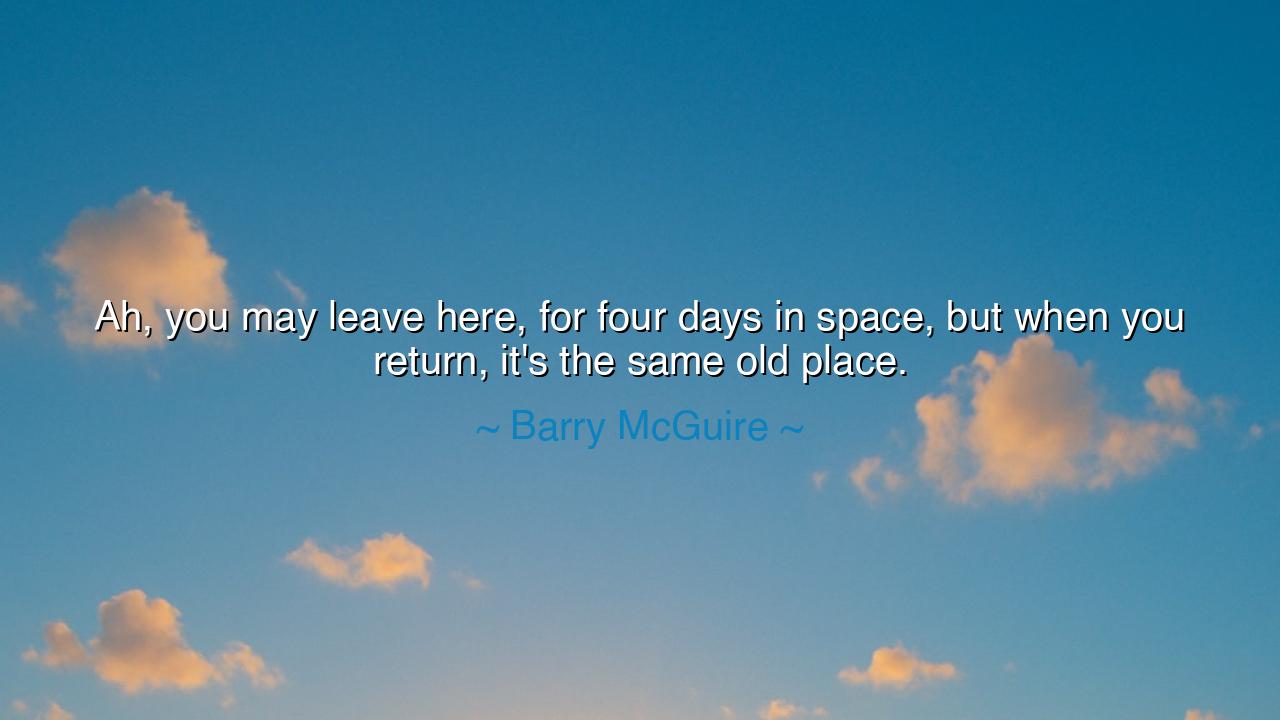
Ah, you may leave here, for four days in space, but when you
Ah, you may leave here, for four days in space, but when you return, it's the same old place.






Barry McGuire, the singer whose voice carried the protest of a restless generation, once sang with piercing simplicity: “Ah, you may leave here, for four days in space, but when you return, it’s the same old place.” These words, drawn from the anthem Eve of Destruction, are more than lyrics—they are prophecy. For they remind us that even the triumph of leaving Earth, even the glory of space exploration, cannot alone transform the human heart or heal the wounds of a broken world.
The meaning is both wondrous and sorrowful. To leave the Earth is to touch the heavens, to see our fragile planet from above, to marvel at the silence of the cosmos. It is to escape, for a brief span, the noise of conflict, greed, and division. Yet McGuire warns us: when the astronauts return, they land again in the midst of war, injustice, and fear. The same old place waits—unchanged, unhealed, heavy with human folly. The stars may inspire awe, but they cannot by themselves remake the Earth.
Consider the time in which McGuire sang these words: the 1960s, when rockets soared to the sky while cities below burned with riots, while young men were sent to war in Vietnam, while civil rights were yet denied to many. Humanity reached upward with astonishing brilliance, yet stumbled downward in its dealings with one another. The contradiction was stark: men could circle the moon, but could not circle the table in peace with their neighbors. This is the cry of McGuire’s quote—that technological progress without moral progress is hollow.
History gives us many such examples. Rome built aqueducts and roads that astonish us still, but within its borders slavery thrived, corruption spread, and cruelty abounded. The brilliance of its engineering could not save it from the rot within. Likewise, in our own age, we carry devices that speak across oceans, yet we struggle to speak with kindness to those across the street. The same old place remains, not for lack of tools, but for lack of wisdom.
Yet his words are not meant only for despair; they are a summons. For they remind us that the world will not change by escape, but by transformation. The heavens can inspire us, yes, but the true work lies here on Earth: healing divisions, ending wars, lifting the poor, reconciling enemies. If we return from the stars only to live as before, we have wasted the vision given to us. But if we take that vision and let it awaken our compassion, then the Earth may yet become new.
The lesson, then, is clear: do not look to escape the world’s problems; look to engage them. Do not dream only of other planets while neglecting the soil beneath your feet. Each of us is called to labor in the same old place, to make it better through justice, mercy, and truth. Space can remind us of our unity, but only love can make it real.
Practical action follows: take inspiration from the stars, but act here on Earth. Work for peace where there is conflict. Build kindness where there is cruelty. Share wisdom where there is ignorance. Let every encounter be your chance to change the same old place into something new. For the true utopia is not found by fleeing to other worlds, but by remaking this one with courage and compassion.
So let McGuire’s words endure as both warning and challenge: “You may leave here, for four days in space, but when you return, it’s the same old place.” Do not let it remain the same. Take the vision of the stars and bring it down to earth, until war gives way to peace, until division yields to unity, until this “same old place” becomes the new creation it was always meant to be.






AAdministratorAdministrator
Welcome, honored guests. Please leave a comment, we will respond soon